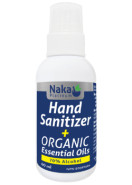Hand Sanitizers
Discover The Difference of Natural Hand Sanitizers To Combat Germs
Hand sanitizer has become indispensable to most people’s daily hygiene routine. Especially in the wake of global health crises, these portable potions offer a convenient way to keep germs at bay when soap and water are out of reach. However, the surge in hand sanitizer usage has prompted a closer look at the ingredients within these seemingly innocuous bottles and curiosity if natural hand sanitizers are better. Read more >-
 Hand Sanitizer + Organic Essential Oils from Naka Platinum provides 70% ethyl alcohol and a mixture of essential oils including eucalyptus, oregano, and tea tree to effectively kill harmful bacteria and germs. In combination with regular hand washing, Naka Platinum's Hand Sanitizer helps to prevent the spread of unwanted germs and come...Hand Sanitizer + Organic Essential Oils from Naka Platinum provides 70% ethyl alcohol and a mixture of essential oils including eucalyptus, oregano, and tea tree to effectively kill harmful bacteria and germs. In combination with regular hand washing, Naka Platinum's Hand Sanitizer helps to prevent the spread of unwanted germs and comes in a convenient misting pump, making cleaning your hands on the go easy. [LIQUID]+ Earn 7 Reward Points
Hand Sanitizer + Organic Essential Oils from Naka Platinum provides 70% ethyl alcohol and a mixture of essential oils including eucalyptus, oregano, and tea tree to effectively kill harmful bacteria and germs. In combination with regular hand washing, Naka Platinum's Hand Sanitizer helps to prevent the spread of unwanted germs and come...Hand Sanitizer + Organic Essential Oils from Naka Platinum provides 70% ethyl alcohol and a mixture of essential oils including eucalyptus, oregano, and tea tree to effectively kill harmful bacteria and germs. In combination with regular hand washing, Naka Platinum's Hand Sanitizer helps to prevent the spread of unwanted germs and comes in a convenient misting pump, making cleaning your hands on the go easy. [LIQUID]+ Earn 7 Reward PointsSale: $7.99
Reg.: $8.99 (Save $1.00)
Out of Stock
Natural Hand Sanitizers: Why Are They Better For You?
Hand sanitizer has become indispensable to most people’s daily hygiene routine. Especially in the wake of global health crises, these portable potions offer a convenient way to keep germs at bay when soap and water are out of reach. However, the surge in hand sanitizer usage has prompted a closer look at the ingredients within these seemingly innocuous bottles and curiosity if natural hand sanitizers are better. Let’s try to unravel the mysteries behind hand sanitizers and explore their composition, potential concerns, and the ongoing debate surrounding their advantages and disadvantages.
Understanding How Hand Sanitizers Work
At their core, hand sanitizers are antiseptic solutions designed to reduce the number of microorganisms on your hands, providing a quick and effective alternative to traditional hand washing. Most commercial hand sanitizers contain alcohol, typically in the form of ethyl alcohol or isopropyl alcohol, as the primary active ingredient. This key component works by denaturing the proteins of bacteria and viruses, rendering them inactive.
While the primary function of hand sanitizers is to kill harmful germs, concerns have been raised about certain ingredients commonly found in commercial formulations, and rightfully so. Chief among these is the use of toxic chemicals, including triclosan, a synthetic pesticide, artificial fragrances, phthalates, and parabens, known endocrine disruptors, neurotoxins, and, in many cases, carcinogens. Sodium Lauryl Sulfate and Sodium Laureth Sulfate are also frequently included in conventional hand sanitizers, acting as surfactants that can irritate the eyes, lungs, and skin. Due to these toxic ingredients, many people are turning to natural hand sanitizers.
Additionally, it's worth noting that conventional hand sanitizers should be used with caution around pets, and pets shouldn't lick your hands after you've used these products. Lastly, the overuse of alcohol-based sanitizers can contribute to the development of antibiotic-resistant bacteria, presenting a long-term threat to public health.
Advantages of Sanitizers
The undeniable convenience of hand sanitizers is a significant factor contributing to their widespread adoption. Portable, easy to use, and requiring no water, they offer a practical solution for maintaining hand hygiene on the go. Moreover, hand sanitizers can be particularly effective in high-traffic areas where traditional hand washing facilities may be limited, such as public transportation or crowded events.
Disadvantages Sanitizers
Despite their popularity, hand sanitizers are not without drawbacks. Overreliance on sanitizers may compromise the skin's natural microbiome, potentially leading to an increased risk of infections in the long run. Also, as previously mentioned, conventional hand sanitizers often contain highly toxic ingredients that can cause a whole slew of health issues. Additionally, not all hand sanitizers are created equal, with some formulations providing inadequate protection against certain types of germs. Furthermore, the environmental impact of the widespread use of single-use hand sanitizer bottles raises concerns about plastic waste.
The Rise of Natural Hand Sanitizers & Shopping For A Quality Product
In response to the concerns surrounding conventional hand sanitizers, there has been a growing interest in natural alternatives. Natural hand sanitizers typically feature plant-based ingredients such as aloe vera, essential oils like tea tree (use with caution around pets because tea tree is toxic to animals) and lavender, and other botanical extracts with antimicrobial properties. Choosing a natural hand sanitizer offers the benefits of effective germ-killing without the drawbacks associated with synthetic chemicals. Moreover, these formulations are gentler on the skin, making them suitable for regular use without the risk of irritation.
Some of the best natural, non-toxic hand sanitizer brands on the market include:
- Attitude
- Eco Ideas
- Naka
- Prairie Naturals
- Dr. Bronner’s
You can purchase natural hand sanitizers in health food stores, from supplement retailers, and online.
Back to Top ↑





















